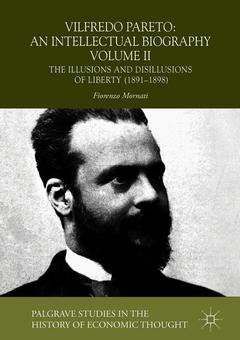Vilfredo Pareto: An Intellectual Biography Volume II, 1st ed. 2018 The Illusions and Disillusions of Liberty (1891–1898) Palgrave Studies in the History of Economic Thought Series
Auteur : Mornati Fiorenzo

This three volume series of intellectual biography considers the life, work and impact on economic, social and political theory of the Italian economist, sociologist and political scientist Vilfredo Pareto (1848-1923).
This second volume follows Pareto from his time teaching at Lausanne to the juncture in his life where he first began to make theoretical contributions of his own. Mornati considers Pareto?s work on pure economics, general equilibrium, welfare economics and the economic case for socialism, as well as his critical observations of Italian and Swiss public policy.
Chapter 1: Relations between Pareto and the University of Lausanne.- Chapter 2: Pareto as a critical observer of the Italian and Swiss political scenes.- Chapter 3: Pure economics.- Chapter 4: General economic equilibrium.- Chapter 5: The economics of welfare.- Chapter 6: From free-trade propaganda to the theory of international trade.- Chapter 7: The money.- Chapter 8: Other topics in applied economics.- Chapter 9: The economic theory of socialism.- Chapter 10: The law of income distribution and various statistical complements.- Chapter 11: Initial development of a new sociology.- Chapter 12: Further general reflections on politics.- Chapter 13: Early critical reactions to Pareto.
Examines Pareto's role in teaching political economy and other issues of applied political economy
Reviews Pareto's early contributions to pure economics, welfare, equilibrium theory, monetary circulation, sociological-ideological thought, income law and private property
Analyses the first critical success of Pareto
Date de parution : 02-2019
Ouvrage de 319 p.
14.8x21 cm
Disponible chez l'éditeur (délai d'approvisionnement : 15 jours).
Prix indicatif 126,59 €
Ajouter au panierThèmes de Vilfredo Pareto: An Intellectual Biography Volume II :
Mots-clés :
Vilfredo Pareto; History of economic thought; Pareto principle; Pareto efficiency; Economic theory; Economic sociology; Economic philosophy; Teaching of political economy; Economic crisis; Italian socialist party; Italian radical party; Pure economics; Economic methodology; General economic equilibrium; Walrasian general equilibrium; Welfare economics; Theory of international trade; Latin Monetary Union; Economic Theory of Socialism; Analytical Implications of Income Law



